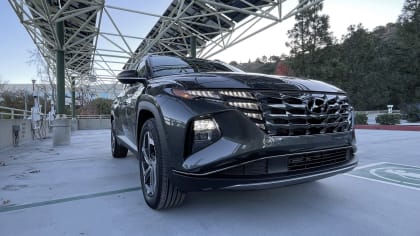2025 Mazda CX-70 PHEV Premium Plus

The Mazda CX-70 PHEV is a near-luxury, two-row SUV with plenty of plug-in power
The Mazda CX-70 PHEV competes with other hybrid SUVs including the Toyota Crown Signia and the Hyundai Santa Fe Hybrid. However, with a starting price of $54,400, the CX-70 costs a little more than its rivals, but its feature content and plug-in powertrain could be enough to win some buyers over.
By Joe Santos
Mon, Mar 24, 2025 06:35 AM PST
Above: The 2025 Mazda CX-70 PHEV has an as-tested price of $59,420.
All photos by the author.
A few months back, I reviewed the 2025 Mazda CX-70 3.3 Turbo, which is the latest model to hit the Japanese automaker’s lineup. It’s essentially a CX-90 without the third row, which means it has the same amount of exterior heft and interior space, but only five seats. It’s a good choice for those with small families or those who need more space and comfort during their daily commutes.
Interior
Step inside the Mazda CX-70 PHEV and you’re sure to be impressed with its quality and attention to detail. My tester for the week was a top-trim Premium Plus model, so it had all the bells and whistles included. Some of the most standout features included the Nappa leather-trimmed seats with heating and ventilation, second-row heated seats and steering wheel, and the panoramic moonroof. Overall, the CX-70 was nicely laid out with a minimalist design and a large infotainment screen that sits front and center.

Everything is well within reach of the drive, including the shifter and the rotary knob that controls the infotainment screen. There is also plenty of room up front for the driver and passenger, in addition to a large amount of room in the second row for the three passengers that can fit back there. The second row seat back can also be reclined for added comfort and the deep floor area makes it accommodating for tall passengers.

I even had a friend that is over six-feet tall sit back there on an hour-long road trip and he noted that it was very comfortable the whole time. In that case, the CX-70 should work perfectly fine for anyone shorter. Additionally, the lack of a third row means that there is a wealth of cargo space, which measures a whopping 39.6 cubic feet. When the seats are folded down the cargo space grows to 75.3 cubic feet.
Exterior
The Mazda CX-70 has a handsome and sophisticated exterior look. The full-LED headlights up front flank a large plastic grille that gives the car an imposing look. The 21-inch wheels fill the fenders well and the slim LED rear taillights complete the look.

The CX-70 is very easy to get in and out of and the rear bumper sits low, which makes loading large cargo a breeze. Additionally, I liked that all four doors opened when I touched the driver’s side door handle, making it convenient for the passengers to enter quickly.
Powertrain and Driving Impressions
Mazda equipped the CX-70 with two different powertrain options. The CX-70 3.3 Turbo S that I drove before was fitted with a turbocharged 3.3-liter inline-six engine that was assisted by a 48-volt mild-hybrid system. This time around, the CX-70 PHEV was strapped with a 2.5-liter, four-cylinder engine that’s mated to a 68-kW electric motor for a total system output of 323 horsepower.
Mazda says that the CX-70 Hybrid can get up to 26 miles of electric range when the battery is fully charged, which runs out quickly in my experience. The range depleted fast, so I brought it to a level 2 charger to add some juice. Two hours later, after charging at a rate of around 6-kW, the car gained 24 miles of electric charge.
Mazda says that it should take an hour and a half to get from 20 percent to 80, which is somewhat accurate. Just note that the charge times can vary greatly depending on the charger that you’re using, the ambient temperature, and whether someone else is plugged into the charger as well.

Nonetheless, the car charged almost fully, which allowed me to drive it on electric only for about a day before it ran out. When it comes to power, the CX-70 does feel a lot more powerful with the assist of the electric motor (when it has juice). During my week with the car, I averaged 26.9 mpg, which is on par with the EPA estimate. It’s also only a little higher than the 25 mpg I averaged with the non-hybrid CX-70.
There is plenty of low-end torque when accelerating off the line and mid-range power for freeway onramp mergers. However, when the electric power runs out, the CX-70 switches to just using the four-cylinder engine power, which makes it feel lethargic. It also sounds pretty coarse under hard acceleration.
Power aside, the CX-70 is easy to maneuver when driving and very manageable when in tight parking lot situations. Its turning radius is good and the car drives smaller than it looks. Also, the visibility from the driver’s seat is really good.
Technology
The Mazda CX-70 is filled with all the tech features that most drivers could want and need. Some of the heavy-hitting ones include a Bose 12-speaker premium sound system, wireless Apple CarPlay and Android Auto, a wireless phone charging dock, and dual 12.3-inch displays for the infotainment and driver information.

There is also the ability to connect to Alexa, which allows you to make calls, get directions, check the weather, and control the smart devices in your home.
Safety
The National Highway Traffic Safety Administration (NHTSA) has not rated the Mazda CX-70 yet, but buyers can rest assured that it has everything to keep them and their passengers safe. Some of the standout safety equipment includes a driver-attention warning, adaptive cruise control, lane-keeping assist, blind-spot monitoring and traffic sign recognition. There are also parking sensors on the bumpers, which helps with parking the car, in addition to plenty of airbags should the worst happen.
Summary
The 2025 Mazda CX-70 PHEV is an excellent two-row SUV that has a lot of style, power, and, practicality. However, for an as-tested price of $59,420, I’m not sure that it’s worth it. Not because it’s a bad car, but mainly due to the powertrain. Considering the electric charge runs out so quickly and leaves you with a not-so-powerful four-cylinder engine, I think the regular gas-powered CX-70 could be a better choice. Especially because it’s cheaper and the fuel savings between the two are negligible.

Compared to its competitors, the Toyota Crown Signia and Hyundai Santa Fe Hybrid, I would say that the CX-70 trails behind them in terms of fuel efficiency. But it’s great when it comes to passenger and cargo space, which could be more valuable to those shopping for an SUV of this type.
About The Author

Joe Santos is an automotive journalist with over 10 years of professional writing and editing experience. His article topics range from full-length car reviews to car-buying advice. He even spent four years selling cars at a few different dealerships, so he may know a thing or two if you’re in the market for a new or used car.






